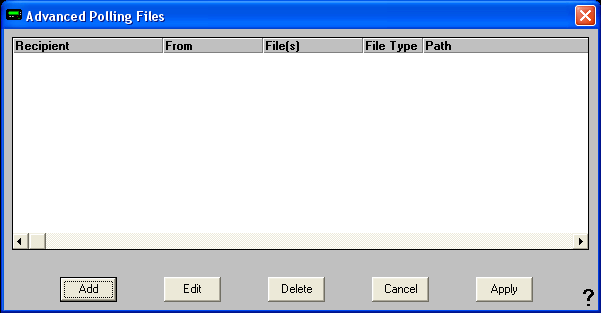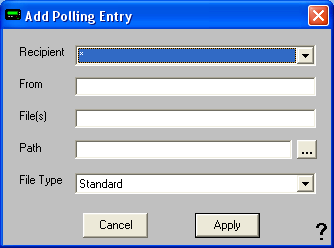
The files sub-section of the Advanced Polling option is for determining additional polling directories, custom file types, and other information. As shown above, the six options are Add, Edit, Delete, Cancel, and Apply.
Option
|
Function
|
Add
|
Adds a new Advanced Polling rule.
|
Edit
|
Edits an existing Advanced Polling rule
|
Delete
|
Removes an existing Advanced Polling rule.
|
Cancel
|
Cancels all recent changes.
|
Apply
|
Applies new changes and rules.
|
To add an Advanced Polling Files option, click on the Add button. You should then receive this prompt:

Setting
|
Function
|
Recipient
|
By default, this field is set to all recipients (*). If the asterisk option (*) is used, the message's recipient and from fields are extracted from the polled file. If a recipient's name is used, any messages contained in the specified files described in the 'File(s)' and 'Path' fields are sent to this recipient.
|
From
|
This field is only used when a specific recipient or group is specified in the Recipient field. If a specific recipient is used in the recipient field above, the 'From' field becomes part of each message collected by this polling entry.
|
File(s)
|
This field is used to describe what files are polled by this entry. Wildcard characters (* and ?) may be used. For example, an entry of *.txt will poll all files that end with .txt whereas an entry of ?at will collect files like cat, bat, and rat, but not 'flat'.
|
Path
|
This field specifies the location this GetAscii polling entry will monitor for ascii files to be processed. It can be set to a local path (c:\ascii\, for example) or a UNC path (\\server\path\). Wildcard characters are not valid in this field.
This field has no bearing on the actual polling directory specified in the base settings of the GetAscii module.
|
File Type
|
There are four options for the file type of each Advanced Polling rule:
Standard: The text file is in the standard ascii format (refer to the What is Ascii? section for more detail). This is option is usually used when files are in the standard ascii format, but aren't named with the standard .asc extension, or are in a directory other than the main GetAscii polling directory. When the Standard file type is selected, the other Advanced Polling options (Symbols, Record, Recipient, Sender, and Message) are not used.
Custom: When the Custom file type is selected, the other Advanced Polling options (Symbols, Record, Recipient, Sender, and Message) are used. Each text file must contain a single message, but the message information is not in the regular format and must be extracted from the text file using the Symbols, Record, Recipient, Sender, and Message options.
Adding: The ascii file specified by the File(s) field periodically has message information added to the end of the file. With this file type the GetAscii Interface will read in any new data added to the file and extract the message information using the Symbols, Record, Recipient, Sender, and Message options.
Changing: The ascii file changes periodically. Each time the file specified in the File(s) field is changed, the GetAscii Interface will attempt to extract message information from it using the Symbols, Record, Recipient, Sender, and Message options. This option is different from Adding because the Adding option only looks at the end of the file specified. The Changing option assumes the entire file will be modified, not appended to.
|
|

